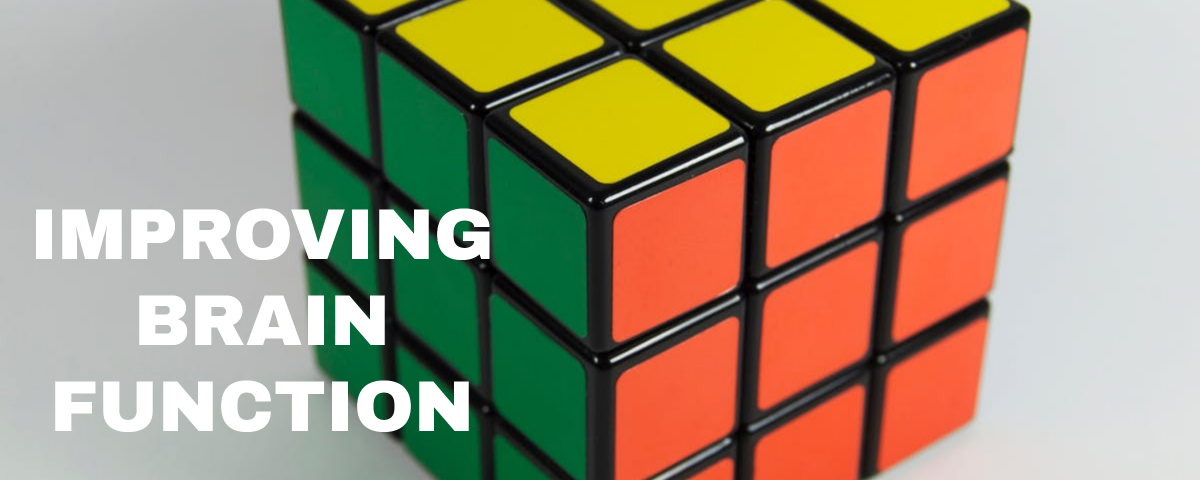Lifestyle Interventions to Improve Cognitive Decline
Our brain function is important to the quality of life. Our brain allows us to learn new skills, enables our independence, our personality, likes and dislikes and the ability to remember our social connections. That is why when patients notice a cognitive decline, it is understandably very upsetting. Subjective cognitive decline can be an early sign of a progressive neurodegenerative condition such as Alzheimer’s disease. It is not uncommon for patients to have mild subjective symptoms of memory loss, “senior” moments. Often these types of symptoms are attributed to aging and ignored until it is not possible to ignore the impact on daily life. By 2050, it is estimated by the CDC that the incidence of Alzheimer’s dementia is expected to triple in the US population. That means many of us are future dementia patients. There is a growing body of evidence that lifestyle interventions now can help improve your brain function and reduce your risk of developing this life altering disease.
The top 5 lifestyle interventions to improve your cognitive function.
1.GET SOME EXERCISE– We know that exercise increases your BDNF “Brain Derived Nerve Growth Factor”. This improves neuroplasticity and can help keep your brain resilient and healthy. Aerobic exercise training is associated with modest improvements in attention and processing speed, executive function, and memory. Exercise improves cognitive ability in patients with mild cognitive decline. In a study of patients with subjective memory impairment one group was given a physical activity program of 142 minutes per week of exercise and compared to a group of control subjects. There was modestly improved cognition relative to controls in older adults with memory impairment.
2.MANAGE YOUR STRESS– We all have stress. It is how we perceive our stress that influences our hormones and our thinking. Think about the last time you were frazzled. Often our thinking is not as clear in times of stress. That is the short-term impact of cortisol, stress hormone. Cortisol is the hormone in the body produced by our adrenal gland when our brain perceives “stress”. Magnify that effect when our stress hormones are in “flight or fight” sympathetic nervous system overdrive daily for many years. High levels of cortisol associated with lower memory function and speed of information processing. Higher levels of plasma cortisol levels associated with greater age related cognitive change. In one study, high cortisol at age 45 associated with poorer verbal memory and fluency at age 50! Daily activities to invoke the relaxation response such as meditation, prayer, mantra, exercise and social connection can help reduce daily stress.
3.GET YOUR SLEEP– Poor quality and reduced quantity of sleep is associated with decreased cognitive decline. There are sleep disorders (such as sleep apnea) where people do not get quality sleep and that can affect brain function. Sleep apnea is a problem where there are pauses in breathing during sleep and is diagnosed with a sleep study. Sleep quantity is also very important for our brain health. Sleep deprivation impairs learning and memory, decreases alertness and attention, decreases response time and impairs decision making. One study showed that commonly experienced levels of sleep deprivation depressed performance to a level equivalent to that produced by alcohol intoxication! Sleep debt has a neurobiological “cost” which can accumulates over time. Try to get at least 7 hours of sleep every night for optimal brain performance. If you suspect a sleep disorder such as sleep apnea it is important to be tested through a sleep study.
4. REDUCE YOUR SUGAR– Sugar has permeated the standard American diet in many of our processed foods. Reducing refined sugar and refined grain products such as bread and pasta may be helpful in reducing your risk of developing dementia. There is a strong association between diabetes and dementia. Even in patients without diabetes, higher levels of blood glucose (sugar) increased risk of dementia. We know that it is the refined sugar and refined grain products and other added sweeteners that increase our blood glucose levels. Reducing these foods in the diet and exchanging them for fresh vegetables, fruits, proteins, healthy fats and whole grains (that have higher fiber content) can reduce elevation in blood glucose levels.
5.REDUCE YOUR TOXINS– There are a host of environmental toxins we are exposed to daily that can affect our cognition. Reducing your incoming toxins by watching your intake of foods that may contain heavy metals is important for protecting your brain as well as the rest of your body. Avoid eating large predatory fish (such as tuna and swordfish) that contain Mercury. Investigate your personal care products on a website such as www.ewg.org to make low toxicant choices. Choose organic meats, vegetables and fruits to reduce exposure to pesticides and herbicides. Supporting the elimination of toxins in your body is also important. Drink plenty of filtered water, and eating colorful antioxidant and phytonutrient containing fruits and vegetables support biotransformation and elimination.
References:
1. www.cdc.gov
2. Zheng G, Xia R, Zhou W, Tao J, Chen L. Aerobic exercise ameliorates cognitive
function in older adults with mild cognitive impairment: a systematic review and
meta-analysis of randomised controlled trials. Br J Sports Med. 2016 Apr 19.
3. Dose-Response of Aerobic Exercise on Cognition: A Community-Based, Pilot
Randomized Controlled Trial.Vidoni ED, Johnson DK, Morris JK, Van Sciver A, Greer CS, Billinger SA, Donnelly JE, Burns JM. PLoS ONE. 2015 Jul 9; 10(7)
4. Baker LD, Frank LL, Foster-Schubert K, Green PS, Wilkinson CW, McTiernan A,
Cholerton BA, Plymate SR, Fishel MA, Watson GS, Duncan GE, Mehta PD, Craft S.
Aerobic exercise improves cognition for older adults with glucose intolerance, a
risk factor for Alzheimer’s disease. J Alzheimers Dis. 2010;22(2):569-79.
5. Am J Geriatr Psychiatry. 2010 Jan;18(1):42-50. doi: 10.1097/JGP.0b013e3181b970ae.
The association between serum cortisol and cognitive decline in older persons
Psychoneuroendocrinology. 2005 Jun;30(5):505-15. Epub 2005 Jan 25.
6. Plasma cortisol levels, brain volumes and cognition in healthy elderly men.
Psychol Med. 2012 Aug;42(8):1763-73. doi: 10.1017/S0033291711002704. Epub 2011 Dec 1.
7. Morning salivary cortisol and cognitive function in mid-life: evidence from a population-based birth cohort.
8. Sleep deprivation affects multiple distinct cognitive processes.
Ratcliff R, Van Dongen HP.Psychonomic bulletin & review. 2009 Aug; 16(4): 742-751
9. Williamson AM, Feyer AM. Moderate sleep deprivation produces impairments in
cognitive and motor performance equivalent to legally prescribed levels of
alcohol intoxication. Occup Environ Med. 2000 Oct;57(10):649-55.
10. Van Dongen HP, Maislin G, Mullington JM, Dinges DF. The cumulative cost of
additional wakefulness: dose-response effects on neurobehavioral functions and
sleep physiology from chronic sleep restriction and total sleep deprivation.
Sleep. 2003 Mar 15;26(2):117-26.
11. Sleep Extension Improves Neurocognitive Functions in Chronically Sleep-Deprived
Obese Individuals. Lucassen EA, Piaggi P, Dsurney J, de Jonge L, Zhao XC, Mattingly MS, Ramer A, Gershengorn J, Csako G, Cizza G, for the Sleep Extension Study Group.
PLoS ONE. 2014 Jan 15; 9(1)
12. Baker LD, Cross DJ, Minoshima S, Belongia D, Watson GS, Craft S. Insulin
resistance and Alzheimer-like reductions in regional cerebral glucose metabolism
for cognitively normal adults with prediabetes or early type 2 diabetes. Arch
Neurol. 2011 Jan;68(1):51-7.
13 Crane PK, Walker R, Hubbard RA, Li G, Nathan DM, Zheng H, Haneuse S, Craft S,
Montine TJ, Kahn SE, McCormick W, McCurry SM, Bowen JD, Larson EB. Glucose levels
and risk of dementia. N Engl J Med. 2013 Aug 8;369(6):540-8.
14. Valls-Pedret C, Sala-Vila A, Serra-Mir M, Corella D, de la Torre R,
Martínez-González MÁ, Martínez-Lapiscina EH, Fitó M, Pérez-Heras A, Salas-Salvadó
J, Estruch R, Ros E. Mediterranean Diet and Age-Related Cognitive Decline: A
Randomized Clinical Trial. JAMA Intern Med. 2015 Jul;175(7):1094-103.
15. Genuis SJ, Kelln KL. Toxicant exposure and bioaccumulation: a common and
potentially reversible cause of cognitive dysfunction and dementia. Behav Neurol.
2015;2015:620143.
16. Mutter J, Curth A, Naumann J, Deth R, Walach H. Does inorganic mercury play a
role in Alzheimer’s disease? A systematic review and an integrated molecular
mechanism. J Alzheimers Dis. 2010;22(2):357-74.





